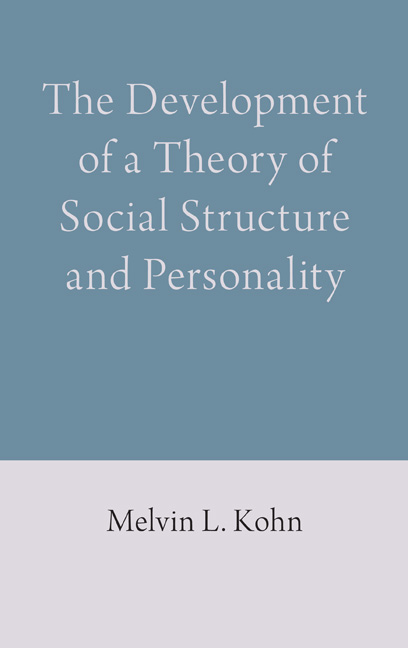Book contents
- Frontmatter
- Contents
- Preface
- 1 Hagerstown and Schizophrenia
- 2 Social Stratification and Parent–Child Relations in Washington, DC
- 3 The Torino Study
- 4 Men Employed in Civilian Occupations in the United States
- 5 The Transformation of the Occupations Study into a Longitudinal Analysis
- 6 Life on Sabbatical Leave in Norway and at the National Institute of Mental Health
- 7 Class, Stratification, and Personality
- 8 Poland under Communism
- 9 Occupational Self-Direction and Distress in Poland
- 10 The Vietnam War, Nixon, and Me
- 11 Japan
- 12 Germany – West and East
- 13 Poland and Ukraine in Transition to Capitalism and Democracy
- 14 The Presidency of the American Sociological Association, Ronald Reagan, and My Job Switch
- 15 My Two Exploratory Expeditions to China
- 16 China in Transition to a Modern Economy
- 17 Retirement, and My Last Sabbatical, at Deep Springs Junior College
- 18 The Theory I Propose
- Index
6 - Life on Sabbatical Leave in Norway and at the National Institute of Mental Health
Published online by Cambridge University Press: 12 July 2019
- Frontmatter
- Contents
- Preface
- 1 Hagerstown and Schizophrenia
- 2 Social Stratification and Parent–Child Relations in Washington, DC
- 3 The Torino Study
- 4 Men Employed in Civilian Occupations in the United States
- 5 The Transformation of the Occupations Study into a Longitudinal Analysis
- 6 Life on Sabbatical Leave in Norway and at the National Institute of Mental Health
- 7 Class, Stratification, and Personality
- 8 Poland under Communism
- 9 Occupational Self-Direction and Distress in Poland
- 10 The Vietnam War, Nixon, and Me
- 11 Japan
- 12 Germany – West and East
- 13 Poland and Ukraine in Transition to Capitalism and Democracy
- 14 The Presidency of the American Sociological Association, Ronald Reagan, and My Job Switch
- 15 My Two Exploratory Expeditions to China
- 16 China in Transition to a Modern Economy
- 17 Retirement, and My Last Sabbatical, at Deep Springs Junior College
- 18 The Theory I Propose
- Index
Summary
Norwegian sabbatical
I received, to my surprise, an invitation to come to Norway for 14 months as a visiting scholar at a private research foundation, the Institut für Bildungsforschung (Institute for Educational Research). The invitation was the handiwork of a visiting scholar at the NIMH, not then my particular friend, but a man destined to become my good friend, Yngvar Löchen. By great good chance, the timing was optimum. Carmi and I were in the midst of planning a further study, another huge study that we could not carry out ourselves, but once we had laid the plans we could turn over the actual survey to the National Opinion Research Center of the University of Chicago (who in fact did a superb job). I could go to Poland, and after my very limited but very exciting experiences in Torino, I was eager to see Europe and the world. Fortunately, my administrative superiors were all in favor of introducing sabbaticals into the government's way of handling its scientists.
My wife's and my splendid year in Norway had several components, but I shall separate them in telling you about them.
The first was my research and my unintended effect on Norwegian research. Norwegian research was a derivative of the German tradition of extraordinarily independent research, a tradition that made no sense to me. Practitioners worked alone and could not consult with anyone, not even with statisticians. For example, in doing doctoral research, the candidate would apply for a stipend from a foundation (whose funds came from betting on soccer games). If he got the stipend, he did the research; if he didn't get the stipend, too bad. Along the way, he never could discuss his research with anyone. It was forbidden to consult even to that extent. When he finished, the oral exam was always held in a huge auditorium, attended by reporters from all seven Norwegian newspapers, for this was an important national event. The quality of the exam was connoted by the titles of the first two examiners: the first opponent and the second opponent. The outcome of the exam was dichotomous: Either there was a wild, drunken dinner, a great celebration, or the victim committed suicide.
- Type
- Chapter
- Information
- Publisher: Anthem PressPrint publication year: 2019



